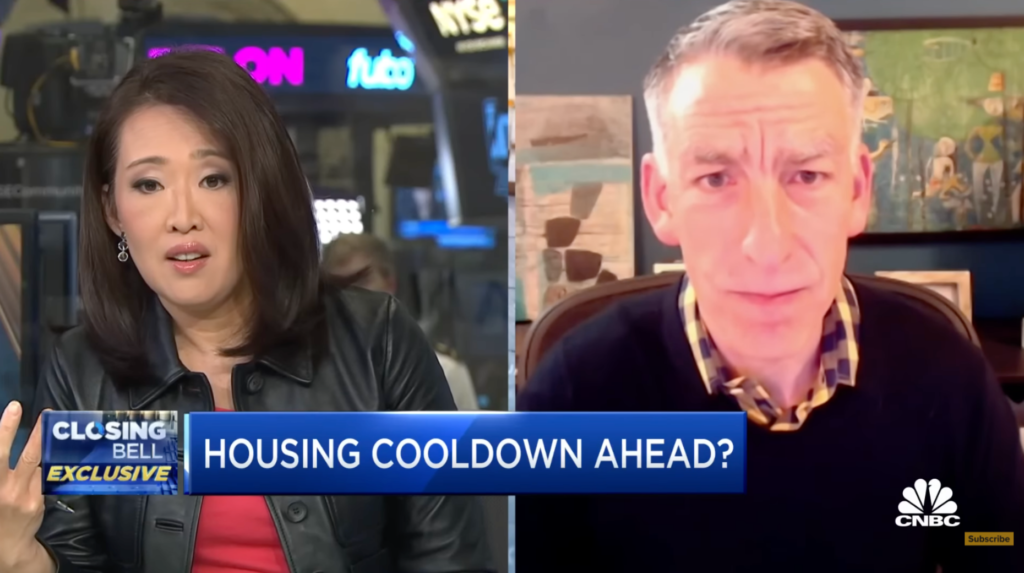During his latest CNBC appearance, Redfin CEO Glenn Kelman said rising mortgage rates, softening home price growth and changing buyer attitudes are all signs of an impending shift.
Redfin CEO Glenn Kelman has read the tea leaves, and according to him, the tides may finally be turning in homebuyers’ favor after two years of record-shattering home price growth.
“[The market will be] probably the same,” he said on CNBC’s Closing Bell series on Thursday. “Rates are probably six percent, inventories are increasing, sales volume will be somewhat fine, but prices are going to soften.”
Kelman didn’t specify how much prices would soften; however, he noted the decline would be enough to place homesellers — especially those looking to make a major upgrade — in a pinch as rising mortgage rates and lower sales profits would make affording a new home difficult.
“So many people are locked into the home they’re living in now with a 30-year, 3.5 percent mortgage. So they’re going to stay in that property forever or maybe they will rent it out,” he explained. “But if they actually want to move up, they are going to have a hard time affording the next place.
“If you combine interest rates [and] what’s happened to home prices over the past year, the mortgage payment for median price home in the United States is up 43 percent,” he added. “So buyers are saying ‘I’ve had enough’ and sellers are starting to freak out a little bit.”
Kelman said homesellers in secondary markets are likely “freaking out” the most, since early-pandemic migration trends led to a boom in demand and the opportunity to make a hefty profit.
“Well, it’s the secondary markets that have been hit the hardest,” he said. “So if you look at Tacoma, Washington, or Sacramento, California, refugees who leave the Bay Area and the Seattle area looking for value have been going to those markets and just sent prices through the roof. And now those prices are taking a step back.”
“We’re also seeing affordable second-home markets like the area in Sarasota, Florida, really taking a step back on prices,” he added. “So that’s where the price reductions are most common.”
Instead of engaging in bidding wars, Kelman said, homebuyers are simply setting their sights on other markets that have more affordable housing.
“One reason the Federal Reserve hasn’t been able to limit demand probably as much as it planned to is that when Charlotte gets too expensive, people look at Charleston, South Carolina, [and] when San Antonio gets too expensive, people look at El Paso,” he said of recent hikes that vaulted mortgage rates past 5 percent.
“We’re seeing homebuyers being much more omnivorous about where they live and what kind of home they want to buy than they used to be because remote work has untethered them,” he added. “So that’s the one silver lining in all of this — when one market gets too pricey, people look at another.”
Redfin’s latest market report, which debuted before Kelman’s CNBC appearance, supported the CEO’s assertions about the market. Nineteen percent of homesellers who listed their home during the four weeks ending on May 1, had a price reduction — the highest rate since 2019.
In addition to softening home price growth, the average time on market, the share of homes that have gone pending within one week, and the share of homes sold above-asking have all flattened.
“The picture of a softening housing market is becoming more clear, especially to homesellers who are increasingly turning to price drops as buyers become more cost-conscious under higher mortgage rates,” Redfin Chief Economist Daryl Fairweather said.
Email Marian McPherson



 Are You Interested in West Eleventh Residences Miami?
Are You Interested in West Eleventh Residences Miami? Are You Interested in ONE Park Tower by Turnberry?
Are You Interested in ONE Park Tower by Turnberry? Are You Interested in Diesel Wynwood Condominium?
Are You Interested in Diesel Wynwood Condominium? Are You Interested in Five Park Miami Beach?
Are You Interested in Five Park Miami Beach? Are You Interested in Cipriani Residences Miami?
Are You Interested in Cipriani Residences Miami? Are You Interested in Bentley Residences Miami?
Are You Interested in Bentley Residences Miami? Are You Interested in Baccarat Residences Brickell?
Are You Interested in Baccarat Residences Brickell? Are You Interested in Aria Reserve Miami?
Are You Interested in Aria Reserve Miami? Are You Interested in 888 Brickell Dolce & Gabbana | Miami?
Are You Interested in 888 Brickell Dolce & Gabbana | Miami? Are You Interested in 600 Miami WorldCenter?
Are You Interested in 600 Miami WorldCenter? Are You Interested in HUB MIAMI RESIDENCES?
Are You Interested in HUB MIAMI RESIDENCES? Are You Interested in WALDORF ASTORIA RESIDENCES?
Are You Interested in WALDORF ASTORIA RESIDENCES?